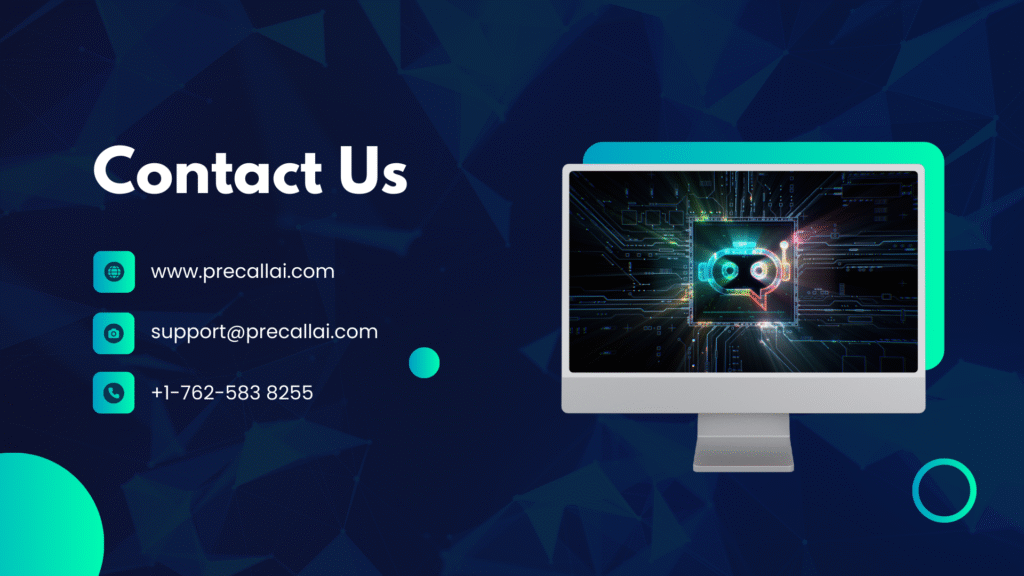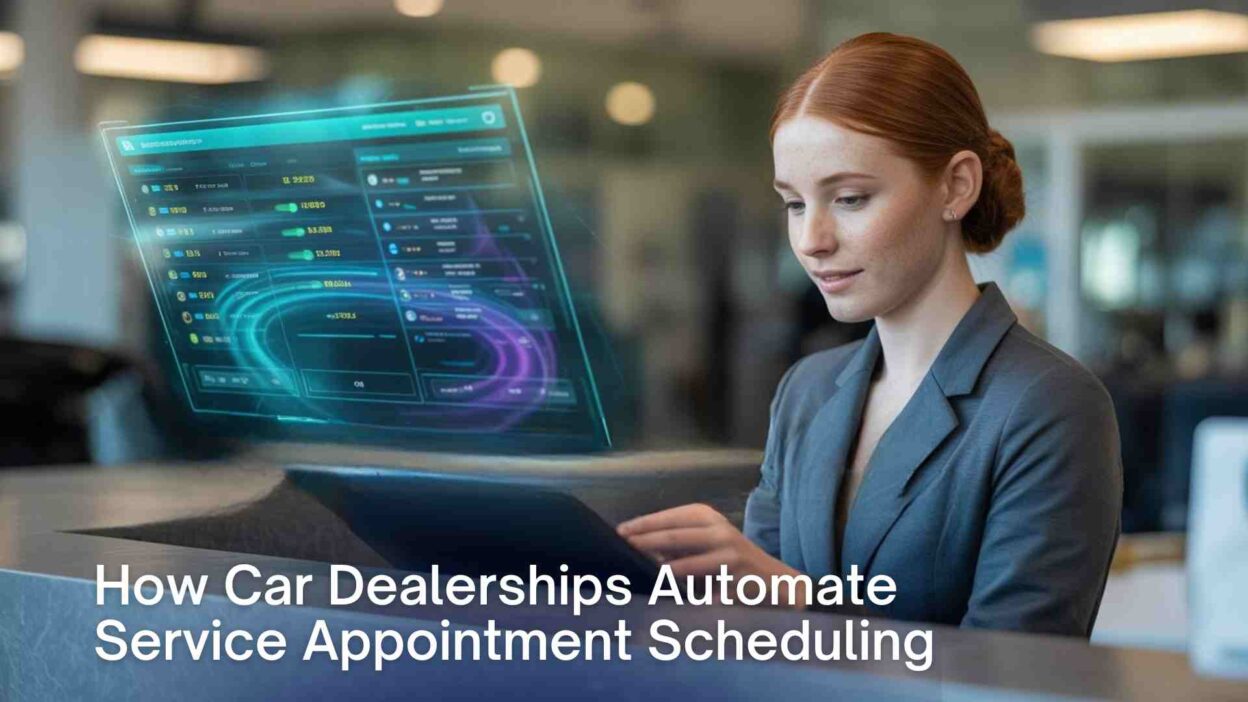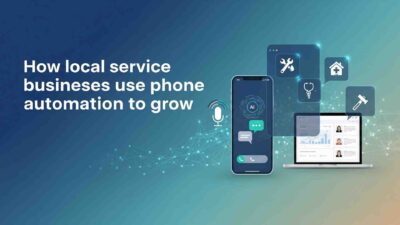TL;DR Car dealerships lose 40% of potential service revenue due to inefficient appointment scheduling. Service departments struggle with phone tag, missed calls, and manual booking processes. Customers abandon appointments when they cannot reach anyone during business hours.
Table of Contents
Auto dealership phone automation transforms how service departments handle customer communications. Modern AI systems manage appointment scheduling, confirmations, and follow-ups without human intervention. These systems work around the clock to capture every service opportunity.
Car service appointment automation eliminates scheduling bottlenecks that cost dealerships thousands in lost revenue monthly. Automated systems handle multiple calls simultaneously while maintaining consistent service quality. Your customers receive instant responses regardless of when they call.
This comprehensive guide reveals how dealership AI calls revolutionize service department operations. You will discover specific implementation strategies, industry applications, and measurable business outcomes. Learn how top-performing dealerships capture more service revenue through intelligent automation.
The Service Scheduling Problem Dealerships Face Daily
Service departments handle hundreds of appointment requests weekly across multiple communication channels. Phone calls, emails, and online forms create scheduling chaos that overwhelms staff members. Manual processes lead to double bookings, missed appointments, and frustrated customers.
Research shows 60% of service calls go unanswered during peak hours. Customers hang up after 30 seconds when nobody answers their call. Each missed call represents $300 in average service revenue walking out the door.
Traditional scheduling methods create bottlenecks that limit service capacity. Service advisors spend 3-4 hours daily on phone scheduling instead of selling additional services. This time drain reduces department profitability by 25-30% according to dealership studies.
Double bookings occur in 15% of manually scheduled appointments. These errors damage customer relationships and create operational chaos. Service bays sit empty while customers wait longer than promised for their vehicles.
Customer satisfaction drops 40% when appointment scheduling takes multiple phone calls. Modern consumers expect instant responses and convenient booking options. Dealerships using outdated systems lose customers to competitors offering better service experiences.
The average dealership loses $50,000 annually from poor appointment management. These losses compound when customers choose competitors for future services. Service retention rates improve dramatically when scheduling becomes effortless for customers.
Auto Dealership Phone Automation Solutions Transform Operations
Modern phone automation systems handle service scheduling with artificial intelligence and natural language processing. These platforms understand customer requests and book appointments instantly. The technology integrates seamlessly with existing dealership management systems.
Automated Call Handling and Conversation Management
Advanced systems answer every service call within two rings. AI assistants engage customers naturally while gathering appointment details. The technology handles multiple conversations simultaneously without quality degradation.
Smart routing directs emergency repairs to immediate availability slots. Routine maintenance appointments fill available slots based on customer preferences. The system optimizes scheduling to maximize service bay utilization throughout the day.
Voice recognition technology understands various customer accents and speaking patterns. The AI adapts conversation flow based on customer responses and service needs. Complex requests transfer seamlessly to human advisors when necessary.
Intelligent Lead Qualification for Service Sales
Automated systems identify high-value service opportunities during initial calls. The technology qualifies customers for extended warranties, maintenance plans, and additional services. This capability increases average service ticket values by 35-40%.
AI assistants gather vehicle information, service history, and customer preferences automatically. This data helps service advisors prepare targeted recommendations before customer arrival. Preparation time reduces customer wait times and increases satisfaction scores.
The system flags customers due for major services based on mileage and time intervals. Proactive outreach generates additional revenue streams beyond basic appointment scheduling. Dealerships report 25% increases in preventive maintenance bookings.
Appointment Scheduling Automation Across Multiple Channels
Smart scheduling systems accept appointments through phone, web, and mobile applications. All channels sync instantly to prevent double bookings and scheduling conflicts. Customers choose their preferred communication method for maximum convenience.
The technology confirms appointments automatically via text, email, or phone calls. Reminder sequences reduce no-show rates by 45-50% across all service categories. Customers receive preparation instructions and estimated completion times.
Real-time scheduling updates accommodate last-minute changes and cancellations. The system automatically offers available slots to waiting customers. This dynamic approach maximizes service bay utilization and customer satisfaction.
CRM Integration Capabilities for Seamless Operations
Advanced automation platforms integrate with popular dealership management systems. Customer data flows automatically between scheduling and service management platforms. This integration eliminates manual data entry and reduces scheduling errors.
Service history synchronization helps advisors understand customer needs before appointment arrival. Previous service records, warranty information, and customer preferences display instantly. This preparation improves service quality and customer satisfaction scores.
The system tracks appointment patterns and customer behavior for better service planning. Managers access detailed analytics about booking trends, peak hours, and service preferences. This data drives operational improvements and staff scheduling decisions.
Multi-Language Support for Diverse Customer Bases
Modern systems support Spanish, English, and other regional languages commonly spoken in dealership markets. Language detection happens automatically during initial customer interactions. Customers communicate comfortably in their preferred language throughout the scheduling process.
Bilingual capabilities expand service reach to underserved market segments. Hispanic customers represent 20% of automotive service spending in many markets. Language barriers previously prevented these customers from accessing dealership services.
Cultural considerations influence how different customer groups prefer to schedule services. The system adapts communication styles based on customer preferences and demographics. This personalization improves customer relationships and service retention rates.
24/7 Availability for Maximum Customer Convenience
Automated systems capture service appointments outside normal business hours. Late-night and weekend availability increases appointment bookings by 30-35%. Customers schedule services when convenient for their personal schedules.
Emergency service requests receive immediate attention regardless of time or day. The system identifies urgent repairs and contacts on-call service personnel. This capability differentiates dealerships from independent repair shops with limited hours.
International customers and shift workers access scheduling services during their available hours. This flexibility accommodates diverse work schedules and lifestyle preferences. Expanded availability creates competitive advantages in crowded automotive markets.
Real-Time Analytics and Reporting for Data-Driven Decisions
Comprehensive dashboards track appointment volume, conversion rates, and customer satisfaction metrics. Managers monitor system performance and identify improvement opportunities. Real-time data enables quick responses to changing customer demands.
Service capacity optimization reports show peak booking times and available slots. This information guides staffing decisions and operational planning. Dealerships reduce wait times while maximizing service bay utilization.
Customer feedback integration provides insights into satisfaction levels and service quality. Automated surveys collect feedback after each appointment completion. This data drives continuous improvement initiatives and customer retention strategies.
Industry-Specific Applications Transform Dealership Operations
Auto dealership phone automation adapts to various service department needs and customer segments. Different applications maximize efficiency while improving customer experiences across all service categories.
Luxury Vehicle Service Scheduling Applications
High-end dealerships require white-glove service experiences that match vehicle price points. Automated systems maintain premium communication standards while handling complex service requests. Luxury customers expect immediate responses and personalized attention.
The technology manages loaner vehicle coordination and concierge service scheduling. Premium customers receive priority appointment slots and expedited service options. This level of service justifies higher labor rates and builds customer loyalty.
Warranty work scheduling for luxury vehicles involves complex authorization processes. Automated systems handle manufacturer approvals and parts ordering simultaneously. This coordination reduces customer wait times for expensive repair procedures.
Service advisors receive detailed customer profiles including purchase history and service preferences. This information enables personalized recommendations for luxury vehicle maintenance. Premium customers appreciate knowledgeable service that protects their investments.
Fleet Service Management Automation
Commercial fleet customers require bulk appointment scheduling and coordinated service planning. Automated systems handle multiple vehicle appointments while managing driver schedules. Fleet coordinators save hours previously spent on phone scheduling.
The technology tracks fleet maintenance schedules and sends proactive service reminders. Preventive maintenance planning reduces fleet downtime and operational costs. Fleet managers receive detailed reports about service completion and upcoming needs.
Emergency fleet repairs receive immediate attention with priority scheduling. The system identifies critical repairs that affect business operations. Fleet customers rely on quick responses to minimize revenue losses from vehicle downtime.
Volume pricing and fleet discounts apply automatically during appointment booking. Automated invoicing and payment processing streamline fleet service transactions. This efficiency improves cash flow for both dealers and fleet customers.
Express Service and Quick Lube Operations
Fast service operations depend on efficient scheduling to maintain customer throughput. Automated systems optimize appointment spacing to prevent bottlenecks and wait times. Customers receive accurate time estimates for express service completion.
Oil change appointments book automatically based on vehicle service intervals. The system tracks customer service history and sends timely reminders. This proactive approach increases customer retention and service frequency.
Same-day service availability displays in real-time for customer convenience. Last-minute appointments fill cancellation slots automatically. This flexibility accommodates busy customer schedules while maximizing service capacity.
Express service pricing displays during appointment booking for transparent transactions. Customers know exact costs before arriving at the dealership. This transparency reduces service disputes and improves customer satisfaction.
Collision and Body Shop Coordination
Insurance claim coordination requires complex scheduling between multiple parties. Automated systems manage appointments with customers, adjusters, and rental car companies. This coordination reduces claim processing time and customer frustration.
The technology handles parts availability checking before scheduling repair appointments. Customers avoid multiple trips when parts arrive on schedule. Efficient coordination improves customer satisfaction and reduces administrative costs.
Damage assessment appointments book quickly to expedite insurance claims. Early assessments reduce rental car costs and customer inconvenience. Fast scheduling demonstrates dealership commitment to customer service.
Body shop capacity optimization ensures efficient workflow and timely completions. The system balances paint booth availability with customer appointment preferences. This planning reduces customer wait times and improves facility utilization.
Implementation and Setup Guide for Dealership Success
Successful auto dealership phone automation implementation requires careful planning and systematic execution. The process typically takes 4-6 weeks from initial setup to full deployment.
Initial System Assessment and Integration Planning
Technical teams evaluate existing dealership management systems for compatibility requirements. Integration mapping identifies data flow requirements between scheduling and service platforms. This assessment prevents implementation delays and system conflicts.
Staff training schedules coordinate with system deployment to minimize operational disruptions. Service advisors learn new workflows while maintaining current appointment volumes. Gradual implementation allows for adjustment periods and feedback incorporation.
Customer communication templates require customization for dealership branding and service offerings. Automated scripts reflect dealership personality while maintaining professional standards. This customization ensures consistent brand experience across all customer touchpoints.
Dealership Management System Integration Requirements
Popular DMS platforms require specific integration protocols for seamless data exchange. Customer records, service history, and appointment details synchronize automatically between systems. This integration eliminates duplicate data entry and reduces scheduling errors.
Real-time inventory connections enable parts availability checking during appointment scheduling. Customers avoid disappointment when parts arrive before scheduled service dates. This coordination improves customer satisfaction and reduces service delays.
Technician scheduling integration optimizes appointment assignments based on skill levels and specializations. Complex repairs assign to certified technicians automatically. This matching improves service quality and reduces customer wait times.
Customization Options for Dealership Branding
Voice personality settings reflect dealership culture and customer service standards. Professional, friendly, or casual tones match target customer demographics. Consistent personality across all interactions reinforces brand identity and customer relationships.
Service menu customization includes dealership-specific offerings and pricing structures. Automated systems present accurate options without requiring manual updates. This accuracy reduces customer confusion and improves appointment booking completion rates.
Holiday schedules and special event coordination maintain accurate availability calendars. The system adjusts automatically for dealership closures and extended hours. Customers receive correct availability information throughout the year.
Staff Training and Change Management Process
Service advisor training covers new workflow processes and system capabilities. Hands-on practice sessions build confidence with automated scheduling integration. This preparation reduces resistance to change and improves adoption rates.
Management dashboards provide visibility into system performance and staff productivity. Supervisors monitor appointment volume, customer satisfaction, and operational efficiency. This oversight enables quick adjustments and continuous improvement.
Customer service standards adapt to include automated system interactions. Staff learn when to intervene in automated conversations for complex situations. This balance maintains personal touch while leveraging automation efficiency.
Timeline Expectations and Milestone Management
Week 1-2: System setup and initial integration testing with DMS platforms Week 3-4: Staff training, workflow development, and process refinement Week 5-6: Pilot program launch with select customer segments for feedback Week 7-8: Full deployment with ongoing monitoring and optimization
Implementation milestones include system testing, staff certification, and customer feedback collection. Regular check-ins ensure project stays on schedule and meets performance expectations. This structure provides accountability and progress visibility.
Post-launch support includes 24/7 technical assistance and ongoing system optimization. Continuous monitoring identifies improvement opportunities and resolves issues quickly. This support ensures long-term success and maximum return on investment.
Available Support and Ongoing Assistance
Technical support teams provide immediate assistance for system issues or questions. Phone, email, and chat support options accommodate different communication preferences. This availability ensures minimal downtime and operational disruptions.
Regular system updates include new features and performance improvements. Automatic updates occur during off-hours to prevent service interruptions. These enhancements keep dealerships competitive with latest automation capabilities.
Training refresher sessions help staff maximize system utilization and identify new opportunities. Quarterly reviews assess performance metrics and identify optimization possibilities. This ongoing education ensures continued success and growth.
Measurable Results and Business Outcomes Drive ROI
Auto dealership phone automation delivers quantifiable improvements across multiple performance metrics. Dealerships typically see positive returns within 90 days of implementation.
Appointment Response Time Improvements
Average response time drops from 4-6 minutes to under 30 seconds with automated systems. Customers receive immediate attention regardless of call volume or time of day. This improvement increases appointment booking conversion rates by 45-50%.
Peak hour performance maintains consistent quality when human staff becomes overwhelmed. Automated systems handle unlimited simultaneous calls without degraded service quality. This capacity eliminates lost appointments during busy periods.
After-hours availability captures 25-30% additional appointment volume from previous missed opportunities. Weekend and evening bookings accommodate customer schedule preferences. This expanded availability generates substantial revenue increases for service departments.
Service Appointment Conversion Rate Increases
Booking completion rates improve from 65% to 85% when customers receive immediate responses. Automated systems eliminate phone tag and scheduling delays that cause customer abandonment. This improvement translates directly to increased service revenue.
Same-day appointment availability increases bookings by 20-25% for urgent repairs. Customers appreciate quick service for unexpected vehicle problems. This responsiveness builds customer loyalty and positive word-of-mouth referrals.
Appointment confirmation and reminder systems reduce no-show rates from 15% to 5%. Customers receive multiple touchpoints leading up to scheduled service dates. This reduction improves service bay utilization and revenue predictability.
Weekly Time Savings for Service Staff
Service advisors reclaim 15-20 hours weekly previously spent on phone scheduling activities. This time redirects to high-value activities like customer consultation and service sales. The efficiency improvement increases average service ticket values.
Administrative tasks reduce by 40% when appointment data flows automatically into service systems. Manual data entry errors eliminate while processing speed increases significantly. This accuracy improves customer satisfaction and operational efficiency.
Follow-up call automation frees staff to focus on complex customer service situations. Routine confirmations and reminders happen automatically without staff intervention. This automation allows personal attention for situations requiring human expertise.
Cost Reduction Analysis and Savings
Phone system costs decrease by 30-40% when automated systems handle routine scheduling calls. Traditional phone systems require multiple lines and staff to manage call volume. Automation reduces infrastructure needs while improving service quality.
Overtime expenses drop significantly when automated systems handle after-hours scheduling. Staff no longer work extended hours to manage appointment backlogs. This reduction improves work-life balance while reducing operational costs.
Training costs for new service staff decrease when automated systems handle basic scheduling functions. New employees focus on technical skills rather than phone etiquette and scheduling procedures. This efficiency accelerates onboarding and reduces turnover rates.
Customer Satisfaction Score Improvements
Net Promoter Scores increase by 25-30 points when appointment scheduling becomes effortless. Customers appreciate convenient booking and reliable confirmation processes. This improvement translates to increased customer retention and referral rates.
Service department reviews improve from 3.8 to 4.6 stars on average across online platforms. Positive scheduling experiences influence overall service perceptions. These improvements attract new customers and build dealership reputation.
Complaint resolution time decreases when automated systems handle routine issues efficiently. Complex problems receive immediate human attention while simple requests resolve automatically. This balance improves overall customer satisfaction and reduces service disputes.
Before and After Operational Scenarios
Before automation: Service department receives 200 calls daily, answers 120, books 78 appointments After automation: Same department receives 200 calls, answers 200, books 170 appointments
The improvement represents 92 additional appointments weekly or $27,600 in additional monthly revenue. This increase occurs without additional staff or facility investments.
Service advisor productivity increases from $8,000 to $12,000 in monthly service sales per person. Time previously spent on phone scheduling redirects to consultative selling and relationship building. This improvement justifies automation investment within three months.
ROI Calculations and Investment Justification
Average automation system costs $2,000-4,000 monthly depending on call volume and features. Service revenue increases typically exceed $15,000-25,000 monthly from improved scheduling efficiency. This generates 400-500% returns on automation investments.
Payback periods average 2-3 months for most dealership implementations. Revenue increases compound over time as customer satisfaction and retention improve. Long-term benefits include competitive advantages and market share growth.
Customer lifetime value increases by 35-40% when service experiences improve through automation. Retained customers generate higher profits than constantly acquiring new customers. This improvement provides sustainable competitive advantages in crowded automotive markets.
Why Choose Advanced Automation Over Traditional Alternatives
Modern car service appointment automation provides significant advantages over outdated scheduling methods and basic communication tools.
Comparison with Traditional Phone System Limitations
Legacy phone systems require multiple staff members to handle peak call volumes. Customers experience busy signals and long hold times during busy periods. These frustrations drive customers to competitors offering better accessibility.
Manual scheduling creates inconsistencies in service quality and appointment accuracy. Human errors lead to double bookings and missed appointments. These mistakes damage customer relationships and reduce operational efficiency.
Traditional systems lack integration capabilities with modern dealership management platforms. Data silos prevent comprehensive customer service and limit analytical capabilities. This isolation reduces service personalization and upselling opportunities.
Advantages Over Basic Chatbot Solutions
Advanced phone automation handles complex conversations that simple chatbots cannot manage. Voice-based interactions feel more natural for service scheduling than text-based alternatives. Customers prefer speaking about vehicle problems rather than typing lengthy descriptions.
Emotional recognition capabilities allow systems to adapt to frustrated or anxious customers. This sensitivity provides appropriate responses that simple chatbots cannot deliver. Human-like interactions improve customer satisfaction and service outcomes.
Integration depth exceeds chatbot capabilities for comprehensive service management. Phone automation systems access more data sources and provide richer customer experiences. This depth enables personalized service that builds stronger customer relationships.
Unique Features and Competitive Differentiators
Multi-modal communication support allows customers to switch between phone, text, and email seamlessly. Conversations continue across channels without losing context or requiring repetition. This flexibility accommodates diverse customer preferences and situations.
Predictive analytics identify optimal appointment timing based on customer history and preferences. The system learns individual patterns to suggest convenient scheduling options. This personalization improves customer satisfaction and appointment completion rates.
Emergency service prioritization ensures urgent repairs receive immediate attention and scheduling. The system identifies critical situations and activates appropriate response protocols. This capability differentiates dealerships from competitors with basic scheduling systems.
Implementation Simplicity and Speed
Modern automation platforms deploy in weeks rather than months required for custom solutions. Pre-built integrations with popular dealership systems accelerate implementation timelines. This speed enables quick returns on investment and competitive positioning.
Cloud-based architecture eliminates server maintenance and technical management requirements. Automatic updates provide new features without dealer involvement or downtime. This simplicity reduces ongoing costs and technical complexity.
Scalable pricing models accommodate dealerships of all sizes without significant upfront investments. Monthly subscription costs scale with usage rather than requiring large capital expenditures. This flexibility makes automation accessible to single-point dealers and large dealer groups.
Long-Term Cost Effectiveness
Operational costs decrease over time as automated systems optimize efficiency and reduce manual processes. Staff productivity improvements compound as employees focus on higher-value activities. These savings provide long-term financial benefits beyond initial automation gains.
System reliability exceeds human performance for consistent service delivery across all customer interactions. Automated systems don’t have bad days or personal issues affecting service quality. This consistency builds customer trust and dealership reputation.
Competitive advantages compound as customer expectations evolve toward automated service experiences. Dealerships with modern systems attract customers frustrated by competitors using outdated methods. This positioning provides sustainable market advantages and growth opportunities.
Frequently Asked Questions About Auto Dealership Phone Automation
How much does auto dealership phone automation cost monthly?
Pricing typically ranges from $2,000 to $8,000 monthly depending on call volume and feature requirements. Small dealerships start around $2,000 while large dealer groups pay $6,000-8,000 for comprehensive systems. Most providers offer usage-based pricing that scales with business growth.
Implementation costs add $5,000-15,000 for setup, training, and integration services. These one-time expenses cover system customization and staff training. Return on investment typically occurs within 90 days through increased appointment bookings.
Monthly costs include unlimited call handling, system maintenance, and ongoing support. No additional charges apply for peak usage periods or seasonal volume increases. This predictable pricing helps dealerships budget accurately for automation investments.
Is car service appointment automation suitable for small dealerships?
Small dealerships benefit significantly from automation due to limited staff resources. One-person service departments cannot answer phones while serving customers in person. Automated systems capture appointments during busy periods when staff cannot respond.
Affordable entry-level systems provide core functionality without enterprise-level complexity. Basic packages handle appointment scheduling, confirmations, and simple customer inquiries. These solutions deliver substantial benefits at reasonable monthly costs.
Implementation requires minimal technical resources that small dealerships can manage easily. Cloud-based systems eliminate server requirements and technical maintenance. This simplicity makes automation accessible to dealerships with limited IT resources.
Can dealership AI calls integrate with existing service management systems?
Modern automation platforms integrate with all major dealership management systems including CDK, Reynolds, and DealerSocket. Pre-built integrations eliminate custom development requirements and reduce implementation time. Data synchronization happens automatically without manual intervention.
Customer records, service history, and appointment details flow seamlessly between systems. This integration prevents double data entry and reduces scheduling errors. Service advisors access complete customer information during automated appointment bookings.
Real-time synchronization ensures all systems maintain current appointment schedules and customer information. Changes made in one system appear instantly across all platforms. This consistency prevents conflicts and improves operational efficiency.
How does phone automation handle difficult or upset customers?
Advanced systems recognize emotional cues in customer voices and adjust responses appropriately. Frustrated customers receive empathetic responses and priority routing to human advisors. This sensitivity prevents escalation and improves customer satisfaction.
Escalation protocols transfer complex situations to experienced service advisors immediately. The system identifies when customers need human intervention rather than automated responses. This balance maintains efficiency while providing personal attention when needed.
Customer history access allows systems to understand previous service issues and concerns. This context enables more personalized responses to difficult situations. Advisors receive detailed backgrounds before engaging with challenging customers.
Is automotive service scheduling automation legal and compliant?
Phone automation systems comply with federal and state regulations governing customer communications. Call recording and consent requirements integrate automatically into system operations. Legal compliance protects dealerships from regulatory violations.
Data privacy protections exceed industry standards for customer information security. Encrypted storage and transmission protect sensitive customer data. These safeguards meet automotive industry requirements and customer expectations.
Warranty claim automation follows manufacturer guidelines for service authorization and documentation. Automated systems cannot override manufacturer requirements or dealer agreements. This compliance protects dealership relationships with automotive manufacturers.
What languages does auto dealership phone automation support?
Most systems support English and Spanish as standard features without additional costs. Regional language support accommodates Hispanic customers who represent significant market segments. Bilingual capabilities expand service reach and improve customer relationships.
Advanced systems add French, Portuguese, and other regional languages based on local demographics. Language detection happens automatically during initial customer interactions. Customers communicate comfortably without language barriers affecting service access.
Cultural considerations influence conversation flow and communication styles for different language groups. Systems adapt to cultural preferences while maintaining consistent service quality. This sensitivity improves customer satisfaction across diverse communities.
How quickly can dealerships see results from appointment automation?
Most dealerships notice increased appointment bookings within the first week of implementation. Immediate availability improvements generate more bookings from previously missed calls. Customer satisfaction scores improve as scheduling becomes more convenient.
Significant revenue increases typically appear within 30-45 days as systems optimize and staff adapt to new workflows. Service departments report 20-30% appointment volume increases during the first quarter. These improvements compound over time as customer word-of-mouth spreads.
Long-term benefits including customer retention and referral increases develop over 6-12 months. Satisfied customers return more frequently and recommend services to others. These relationship benefits provide sustainable competitive advantages beyond initial booking improvements.
Can dealerships customize what automated systems say to customers?
Comprehensive customization options allow dealerships to maintain brand voice and service standards. Scripts reflect dealership personality while covering required information efficiently. This personalization ensures consistent customer experiences across all touchpoints.
Service-specific messaging adapts to different appointment types and customer needs. Oil change scripts differ from major repair conversations appropriately. This customization provides relevant information while maintaining conversation efficiency.
Seasonal updates accommodate holiday hours, special promotions, and service campaigns. Dealerships modify messaging without technical assistance or system downtime. This flexibility supports marketing initiatives and operational changes throughout the year.
Read More: The Art of Programming Empathy into AI Voice Systems
Conclusion

Auto dealership phone automation solves persistent scheduling challenges that limit service department growth and profitability. Modern systems capture every appointment opportunity while providing superior customer experiences. The technology pays for itself through increased bookings and operational efficiency.
Car service appointment automation eliminates manual processes that waste time and create customer frustration. Automated systems work continuously to maximize service capacity and revenue generation. Your dealership gains competitive advantages that attract customers from competitors using outdated methods.
Dealership AI calls provide consistent service quality that builds customer loyalty and positive reviews. Satisfied customers return more frequently and refer others to your service department. These relationship benefits create sustainable growth beyond immediate automation gains.
Implementation success requires choosing experienced automation providers who understand dealership operations. Professional setup and training ensure maximum benefits from day one of deployment. Ongoing support maintains system performance and identifies optimization opportunities.
The automotive service industry evolves rapidly toward automated customer experiences. Dealerships adopting automation now gain first-mover advantages in their local markets. Customers increasingly expect convenient, responsive service that only automation can provide consistently.





